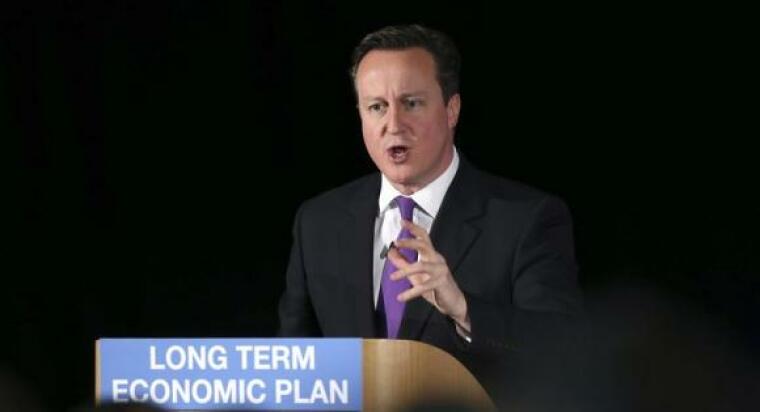G7 nations support effort to 'drive out culture of corruption'
World leaders recognize that there is a correlation between corruption and, among other things, the persecution of religious minorities around the globe, and the G7 said they support the effort to "drive out the culture of corruption."

"The G7 has endorsed the London Summit's outcomes, and will play a leading role in their implementation," British Prime Minister David Cameron said at the conclusion of the G7 Summit in Japan on May 27.
The G7 is a group of the seven industrialized democracies in the world, namely Canada, France, Germany, Italy, Japan, the United Kingdom, and the United States, and the meeting Cameron was referring to was the Anti-Corruption Summit held in London, England in May.
"Corruption is at the heart of so many of the world's problems," the Anti-Corruption Summit's official communiqué reads. "It erodes public trust in government, undermines the rule of law, and may give rise to political and economic grievances that may, in conjunction with other factors, fuel violent extremism. Tackling corruption is vital for sustaining economic stability and growth, maintaining security of societies, protecting human rights, reducing poverty, protecting the environment for future generations and addressing serious and organised crime."
Its aim is to have a common approach in order to: expose corruption, including misusing companies and legal entities to hide the proceeds gained from illegal financial flows; punish perpetrators and support those who have been or are affected by corruption by making sure that there are laws in place; and "drive out the culture of corruption wherever it exists" by encouraging "long-term institutional partnerships which promote integrity." The comminique discusses in further detail how countries individually and collectively can take steps in battling this problem.
Cameron said, reports TruNews, that it is "undermining our security by pushing people towards extremist groups."
The meeting brought together world leaders as well as business executives and representatives from civil society organizations and G20 nations. According to the report, many countries agreed to publish their respective "register of beneficial ownership," which is a list of the real owners of corportation within their territories. Among those who have agreed to or have expressed a desire to maintain such registers are Afghanistan and Nigeria, along with Britain, France, Kenya, and the Netherlands.
However, the United States reportedly did not sign the pledge during the summit, and neither did other territories like the British Virgin Islands, which is deemed as a tax haven.
 Christians don't have to affirm transgenderism, but they can’t express that view at work: tribunal
Christians don't have to affirm transgenderism, but they can’t express that view at work: tribunal Archaeology discovery: Medieval Christian prayer beads found on Holy Island
Archaeology discovery: Medieval Christian prayer beads found on Holy Island Presbyterian Church in America votes to leave National Association of Evangelicals
Presbyterian Church in America votes to leave National Association of Evangelicals Over 50 killed in 'vile and satanic' attack at Nigerian church on Pentecost Sunday
Over 50 killed in 'vile and satanic' attack at Nigerian church on Pentecost Sunday Ukrainian Orthodox Church severs ties with Moscow over Patriarch Kirill's support for Putin's war
Ukrainian Orthodox Church severs ties with Moscow over Patriarch Kirill's support for Putin's war Islamic State kills 20 Nigerian Christians as revenge for US airstrike
Islamic State kills 20 Nigerian Christians as revenge for US airstrike Man who served 33 years in prison for murder leads inmates to Christ
Man who served 33 years in prison for murder leads inmates to Christ


 Nigerian student beaten to death, body burned over ‘blasphemous’ WhatsApp message
Nigerian student beaten to death, body burned over ‘blasphemous’ WhatsApp message 'A new low': World reacts after Hong Kong arrests 90-year-old Cardinal Joseph Zen
'A new low': World reacts after Hong Kong arrests 90-year-old Cardinal Joseph Zen Iran sentences Christian man to 10 years in prison for hosting house church worship gathering
Iran sentences Christian man to 10 years in prison for hosting house church worship gathering French Guyana: Pastor shot dead, church set on fire after meeting delegation of Evangelicals
French Guyana: Pastor shot dead, church set on fire after meeting delegation of Evangelicals ‘Talking Jesus’ report finds only 6% of UK adults identify as practicing Christians
‘Talking Jesus’ report finds only 6% of UK adults identify as practicing Christians Mission Eurasia ministry center blown up in Ukraine, hundreds of Bibles destroyed: 'God will provide'
Mission Eurasia ministry center blown up in Ukraine, hundreds of Bibles destroyed: 'God will provide' Church holds service for first time after ISIS desecrated it 8 years ago
Church holds service for first time after ISIS desecrated it 8 years ago Burger King apologizes for 'offensive campaign' using Jesus' words at the Last Supper
Burger King apologizes for 'offensive campaign' using Jesus' words at the Last Supper Uganda: Muslims abduct teacher, burn him inside mosque for praying in Christ’s name
Uganda: Muslims abduct teacher, burn him inside mosque for praying in Christ’s name